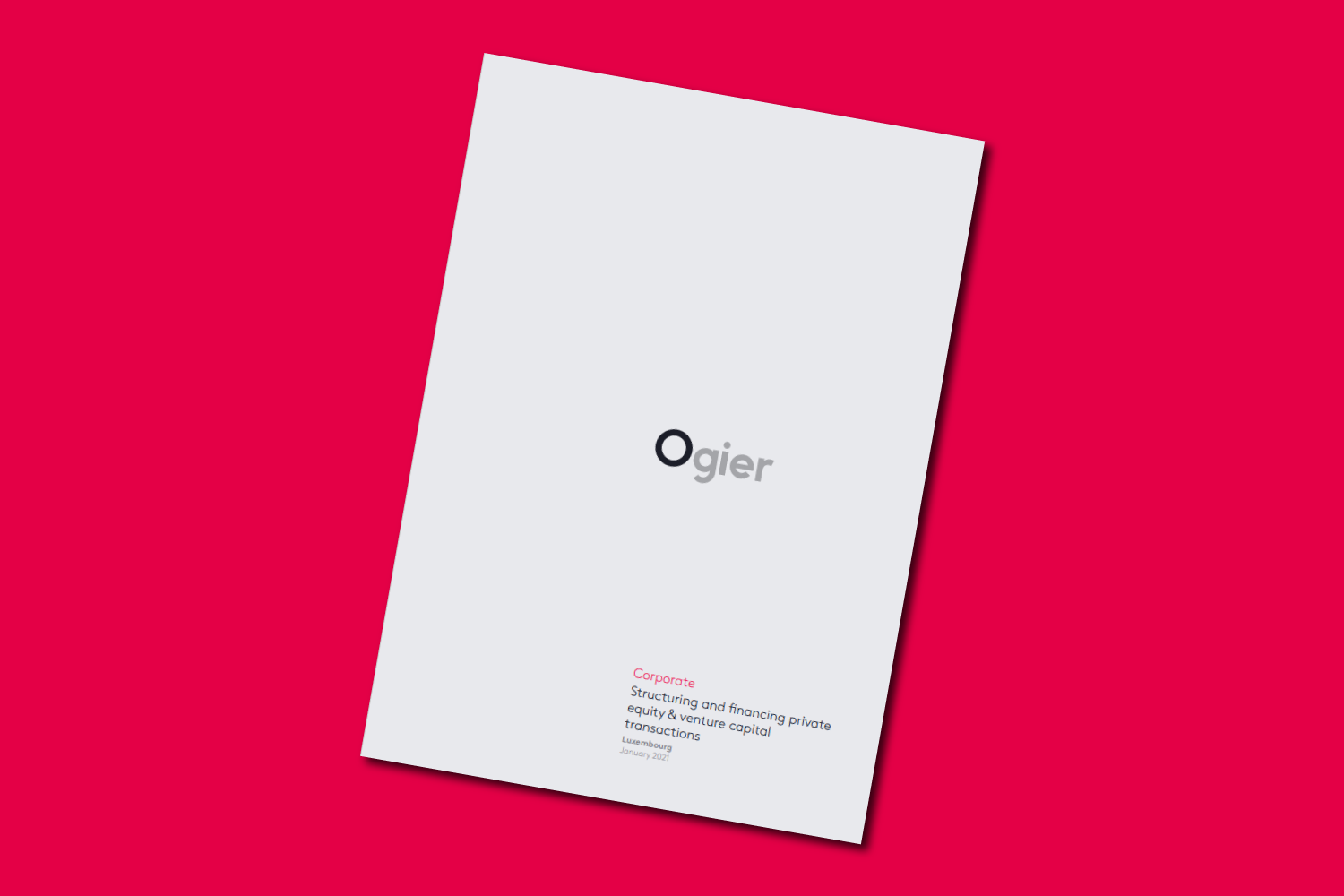
Bertrand Géradin
Partner | Legal
Luxembourg - Legal Services

Bertrand Géradin
Partner
Luxembourg - Legal Services
No Content Set
Exception:
Website.Models.ViewModels.Components.General.Banners.BannerComponentVm

Luxembourg is a jurisdiction of choice for many private equity and venture capital investors / funds due to its political and legal stability and very business friendly environment.
As one of the leading global jurisdictions for structuring foreign direct investment (FDI), Luxembourg has developed over the last two decades into a major hub for private equity and venture capital, both as regards to the location of their funds fundraising and the structuring and financing of their acquisitions.
The optimum balance of financing instruments in relation to any structure will vary depending on many factors, including the laws applicable to the investors, the laws of the jurisdiction of the assets into which investment is made as well as commercial decisions as to the appropriate mix of bank finance and own funds. However, one feature that all Luxembourg domiciled FDI structures have in common is the requirement for an appropriate level of equity investment.
While the level of equity investment will also vary according to the circumstances of the particular investment structure, noting in particular the requirements of applicable debt-equity ratios, the corporate structuring of that equity investment will be largely a matter of commercial choice for investors and fund managers.
This guide provides a general overview of the establishment of private equity and venture capital corporate vehicles and highlights common considerations for private equity firms in relation to equity structuring decisions, including frequently used strategies such as financing instruments and the use of Luxembourg alphabet shares. However, it does not cover investment fund structures.
Luxembourg offers one of the most flexible and attractive legal framework and tax regimes in the EU with a strong and ever-expanding double-tax treaty network and attractive effective tax rates.
Luxembourg offers a wide range of structuring options with regard to non-regulated holding companies SOPARFI (société de participations financières), which are standard ordinary commercial companies governed by the Luxembourg law of 10 August 1915 relating to commercial companies as amended (the Companies Law). These companies are typically used for holding and financing private equity and venture capital investments and may serve as an SPV, a joint venture vehicle.
The vehicles most frequently used to structure private equity and venture capital investments are:
Société à responsabilité limitée – private limited liability company (Sàrl) – when control over the share capital is required (the shares are not freely transferable).
One of the most commonly used vehicles for structuring an acquisition is the Sàrl. It is a private limited liability company, managed by a sole manager or more usually a board of managers, appointed by the shareholders. It is characterised by a very high degree of flexibility and a very limited level of statutory prescription. This makes it easy to tailor to the requirements of single investor or joint venture private investment. The Sàrl is check-the-box eligible.
Société anonyme – public limited liability company (SA) – when flexibility is required, in terms of the variety of instruments that can be issued is required.
The SA is a public limited liability company which is able (in contrast to a Sàrl) to make offers of shares to the public, to have a wider shareholder base and to provide a high level of confidentiality for its investors. As a public company, it does however operate in a more extensive statutory framework than a Sàrl.
Société par actions simplifiée – simplified public company (SAS) – when flexible governance is required.
The SAS offers far more flexibility to the shareholders and managers than the SA. The SAS may be a suitable alternative to the SA or Sàrl for shareholders with special needs in respect of the balance of powers, shareholder relations and the distribution of profits (for example start-ups or joint ventures).
Société en commandite par actions – partnership limited by shares (SCA) – when sponsors want to retain control over the management functions.
The SCA is a corporate limited partnership with a share capital. This vehicle is frequently encountered in Luxembourg structures. Although a limited partnership (with one or more general partners/unlimited partners and one or more limited partners) the SCA is also subject to the same, more extensive, statutory framework as the SA. The SCA is check-the-box eligible.
Société en commandite simple – common limited partnership (SCS) – when tax transparency and structural flexibility are required (with legal personality) sponsors can retain control over the management functions.
The principle which underpins the SCS is one of contractual freedom and the parties are free to contract on whatever terms suit them best from a commercial perspective. The statutory provisions relating to the SCS are limited and thus allow the partnership agreement can be tailor-made to the respective needs and objectives of fund promoters and investors.
Société en commandite spéciale – special limited partnership (SCSp) – when tax transparency and structural flexibility are required (without legal personality) - sponsors can retain control over the management functions.
The SCSp is very similar to the SCS and most of the legal regime which governs it is identical. The main difference between the two vehicles is that the SCSp does not have legal personality.
These entities benefit from flexible provisions of Luxembourg corporate law to accommodate diverse schemas in structuring debt and equity.
The SOPARFI will in principle be a fully taxable resident company subject to ordinary income tax that can take advantage of the participation exemption in Luxembourg and that is eligible to double tax treaty benefits.
The SCS and SCSp are fiscally transparent and are therefore not subject to tax and should not in principle be eligible to double tax treaty benefits. They can however represent an alternative when a fiscally transparent vehicle is required.
A SOPARFI may depending on the circumstances qualify as an AIF.
Download our full guide for a detailed overview of:
It is important to ensure both the private equity or venture capital investors and, as the case may be, management teams receive proper advice to ensure that:
If not, either party could end up making an expensive mistake, particularly if a falling out were to occur between the management team and the sponsor at a later point. For example, the investors could (if not properly advised at the outset) find themselves trapped if they have not taken into account the restrictions for the transfer of shares to non-shareholders.
Our private equity lawyers in Luxembourg provide a full service offering to private equity sponsors, their advisers and intermediary law firms, advising on private equity fund formation, venture capital funds, capital raising, subsequent closings, financings, downstream transactions, wind down, and fund manager relocations.
Get in contact with the team to find out more.
Sign up to receive updates and newsletters from us.
Sign up
No Content Set
Exception:
Website.Models.ViewModels.Blocks.SiteBlocks.CookiePolicySiteBlockVm